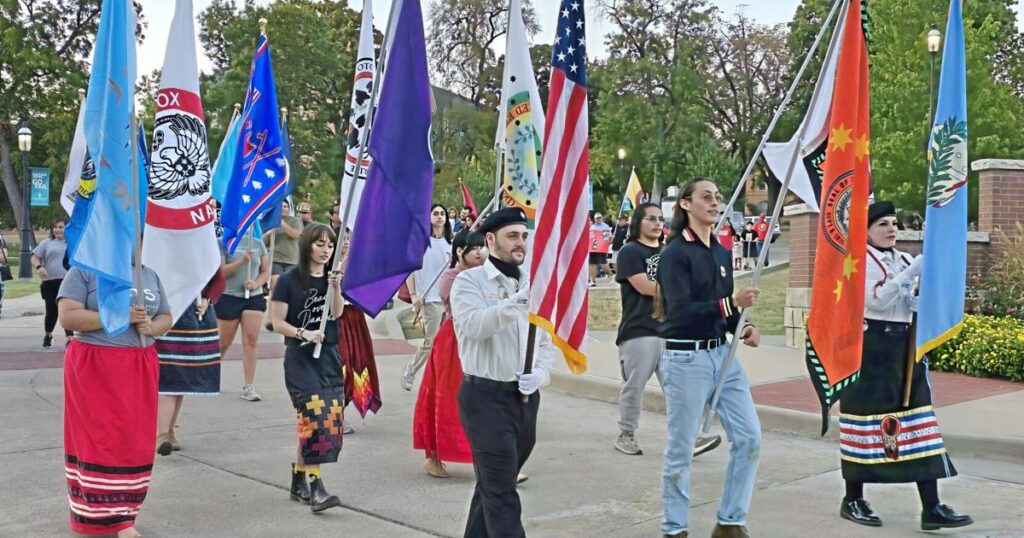TAHLEQUAH – Students, faculty, and community members celebrated Indigenous Peoples Day at Northeastern State University’s Beta Field with traditional games, crafts, vendors and speakers through the afternoon and into the evening of Oct. 14.
The event was organized by the NSU Center for Tribal Studies, and according to Student Engagement Coordinator Gaelen Rose, Indigenous Peoples Day has been celebrated on campus since 2016.
“They do large-scale Indigenous Peoples Day in Oklahoma City and Tulsa, but a lot of us have to stay in town, or be closer to Tahlequah,” Rose said. “We have a huge population of indigenous people in Tahlequah. We also have a huge population of Indigenous people at NSU – roughly 30%-35% of students each semester.”
Attendees played and learned about traditional games such as Cherokee marbles, chunkey, and stickball. Marbles and chunkey are Cherokee games, while other games like stickball originated with Southeastern tribes. It has become a game played across many different Indigenous nations.
“It’s just a time for everyone to engage, and be a part of a community,” Rose said. “I think also it’s important to have this event because it incorporates the NSU community with the greater community of Tahlequah, and other Indigenous people in the area.”
Attendee Gabriel Johnson played chunkey for the first time during the festivities. Players roll a stone, and throw a wooden “spear” into the ground where they think the stone will stop, and whomever is closest wins.
“It’s fun; it’s very fun. But trying to get the spear to stick is a whole other thing,” Johnson said.
Paul Gaines said chunkey is a sport that originated before European contact, and it was often a betting game with two players.
“Traditionally, Cherokees love competition,” Gaines said. “Competition pushes you to be better.”
Wahoo is a game played on a boar, usually with marbles, but was played on the ground with billiard balls during the Indigenous Peoples Day celebration. The point of the game is for a player to move all of his balls or marbles around the board and back to “home.”
“It’s a fun, but sometimes intense game,” Makiya Deerinwater said.
The Cherokees for Black Indian History Preservation Foundation partnered with the Center for Tribal Studies to put on the event, according to Rose. At their booth, they offered clothing and a children’s book that translates several Cherokee words into English, and vice versa.
“Our mission is to preserve the Native American narrative, with an emphasis on Black Indian history,” CBIHP Foundation President Ty Wilson said. “We’ve come out today to promote our organization, and to support NSU, other local organizations, and share the culture.”
Many attendees made baskets for the first time. Among those was Mahko Stout, who was accompanied by his grandmothers, Leah Litka and Beth Wavnum, as well as his grandfather, Jasper Litka.
“This is easy to make,” Mahko said.
His sister, Emberly Stout, was also on hand, and she was the only one in the family who had tried basketweaving before.
“It’s really enjoyable, and soothing, actually.” Leah said.
After the games, attendees heard from speakers, including Gaelen Rose, Vice President of Student Affairs Dr. Jerrid Freeman, Kaleb Proctor, and Nico Jackson.
“While we celebrate this day, in a sense, once a year, for most of our community — whether that’s in the institution here at NSU, or within the Cherokee Nation, and its capital — Indigenous Peoples Day is every day,” Freeman said.
Kaleb Proctor identifies as Keetoowah and Muscogee. While Monday marked a day for celebration, Proctor said it was also important for Indigenous people to “think deeply” about their culture and history.
“We have to remember who we are. We have to live with humility, love, joy, and consciousness,” Proctor said. “If you don’t have these qualities, all of these ways will be forgotten.”
Nico Jackson, also called Unestala, is Cherokee, and said he moved to Tahlequah to study at NSU. He currently serves as the president of NSU’s chapter of the American Indian Science and Engineering Society.
“As Indigenous Americans, we have an obligation not only to ourselves, but to the past and future generations to continue the modern world and continue adapting. This does not mean that we forget who we are; it means we participate in reality, knowing what it means to be rooted in Mother Earth and all of creation,” Jackson said. “You must understand that standing here in America today as an Indigenous person, that your presence on earth is not a random act of chance.”
Jackson said that by merely being alive, Indigenous people have collectively beat the odds of disease, genocide, and suppression of their culture.
At the end of the celebration, attendees checked out various flags honoring many Native tribes, the state of Oklahoma, and the U.S. to present during a Solidarity March from Beta Field to the Cherokee National Peace Pavilion. Dozens of people marched to support Indigenous friends or to honor their culture as Indigenous people.

